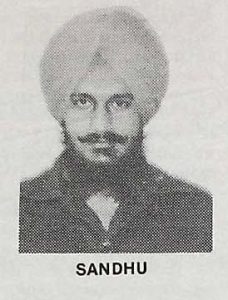

NEW YORK; The magistrate’s decision to stop further hearings in the extradition case of Ranjit Singh Gill and Sukhminder Singh shocked the community leaders and provoked strong reactions from them.
Jagjit Singh Mangat, the president of Sikh Cultural Society in New York said, “It is unfortunate that there is no justice for these young men even in America. We of course do not expect any justice in India but we hope for justice in this country.
This is just the first step in the case, the habeas corpus has already been filed and with the best lawyers we will continue to fight till we get justice for these innocent young Sikhs who the Indian government is trying to extradite on trumped up charges.
The unfortunate case of Jasbir Singh Bajwa who the Indian authorities extradited from the U.S. had confirmed the worst apprehensions of the community, Mangat added. Bajwa was horribly tortured and his legs were broken while under police custody.
Ranjit Singh and Sukhminder Singh have been functionaries of the All India Sikh Students Federation and had escaped from India after being falsely implicated in a case of attempted murder of a superintendent of police called A.P. Pandey. A commission of inquiry appointed by the Punjab Government and headed by Justice Ajit Singh Bains had exonerated both of them but the police still did not drop the cases against them.
Indian government is seeking to extradite Sukhminder Singh for allegedly conspiring to assassinate former Indian army General Vaidya who had led the army’s bloody assault on the Golden Temple in 1984 in which thousands of innocent pilgrims were killed.
Ranjit Singh is charged with conspiracy to kill Lalit Maken a Congress I party functionary who had been identified as one of the main organizers of the anti-Sikh mayhem in Delhi in November 1984.
Thousands of Sikhs were brutally massacred, Sikh religious and educational institutions were burnt, and women were dishonored in this government sponsored action. None of the main accused has been charged and in fact two, H.K.L. Bhagat and Jagdish Tytler have been made Central Ministers in the Rajiy Gandhi Cabinet.
Dr. Gurinder Singh Grewal, president of the World Sikh News Corporation said, “It is a sad situation that we are not only discriminated against at home but also abroad. You do not have to go to India to see Indian justice, rather the lack of it, you can see it here. The prosecutor Judy Russell fabricated documents, yet no substantive action has been taken against her. Would the treatment have been the same if our lawyers had such a thing?”
Judy Russell’s misconduct was revealed when the F.B.1. found out that she had forged threatening letters to herself and magistrate Hedges. These letters were purported to be written on behalf of sympathizers of the Sikhs. They caused the federal marshals to take extraordinary security precautions including shackling of the respondents, posting sharpshooters on rooftops around the courthouse etc. This clouded the perceptions of the people and the media. Russell was subsequently removed from the case and the government had made a motion to reopen it.
Mr. Harbhajan Singh Gill of New York, who has been involved in the case from the beginning said, “Even though we tried we did not get justice in this court, we will fight for this case through various legal and political avenues open to us in this country.
Ronald Kuby a lawyer of the respondents said they were going to file a revised habeas corpus petition which would discuss the misconduct of Judy Russell in January or February next year.
Commenting on the case Kuby said that what was significant was that the government has asked Magistrate Hedges for a rehearing in view of Ms. Russells misconduct. The defense had agreed to the request.
Now the government would have to argue in another court that a further hearing was not necessary. While such a about-face is not difficult for people who are Representing Rajiv Gandhi it will not sit well in an American Court. Kuby said. The ultimate resolution of the case was very far in the future, he added.
Article extracted from this publication >> November 25, 1988